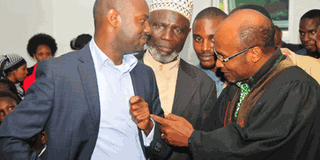Court quashes anti-gays law

One of the pro-gay petitioners Andrew Mwenda (L), renowned anti-gay activist Pastor Martin Ssempa (R) and others after the ruling at the Constitutional Court. PHOTO by Faiswal Kasirye
What you need to know:
Verdict. Judges say at least three people alerted Speaker Rebecca Kadaga about the lack of quorum but she went ahead to preside over the proceedings to pass the law.
KAMPALA.
The Constitutional Court yesterday nullified the Anti-Homosexuality Act 2014 for having been passed by Parliament without the required quorum of at least one third of all legislators.
In a unanimous ruling, the panel of five justices blamed the Speaker of Parliament Rebecca Kadaga for acting illegally by abdicating her constitutional responsibility of ascertaining whether there was quorum in the House before the Bill was passed into law.
The court panel was led by acting deputy Chief Justice Steven Kavuma. The other members were Justices Augustine Nshimye, Eldad Mwangusya, Solomy Balungi Bossa and Rubby Aweri Opio.
The judges held that at least three people, including Prime Minister Amama Mbabazi, alerted Ms Kadaga about the lack of quorum in the House at the time of passing the Bill but she ignored their warning and went ahead to preside over the proceedings to pass the law on December 20, last year.
To that effect, the justices observed that such an illegality by the Speaker of Parliament once brought to the attention of the court, cannot be overlooked.
“Rule 23 of Parliamentary Rules of Procedure requires the Speaker of Parliament even without being prompted by someone else, to ensure that quorum exists. We note that the Speaker was prompted three times that there was no quorum in the House, including the Prime minister, but ignored the same,” the judges ruled.
“We uphold that the act of the 9th Parliament in enacting the Anti-Homosexuality Bill into law without quorum is inconsistent with articles 88, 94 of the Constitution and Rule 23 of the Parliamentary Rules of Procedure. We come to a conclusion that she (Ms Kadaga) acted illegally and failure to obey the law makes the Act null and void,” the judges further stated.
The court also ordered the Attorney General, who represented the government as the respondent in this matter, to pay 50 per cent of the legal costs the pro-gay activists used in their petition.
Shortly after the ruling, pro-gay activists jumped in joy and jubilated over the victory.
City advocate John Francis Onyango, one of the lawyers who represented the pro-gay activists, described the ruling as a landmark decision and said it was victory for the rule of law.
“This is a victory for the rule of law and it’s an indictment on Parliament on the way it conducts its proceedings. The Speaker of Parliament is expected to know not only the Rules of Procedure in Parliament but also the legal requirements,” said Mr Onyango
“She cannot impose certain rules and leave out others as she wants. It is not about what she wants but what the law wants.”
The Attorney General, represented by State Attorney Patricia Muteesi, had argued that the petitioners did not present evidence to prove that there was no quorum in the House on December 20, 2013, when the Bill was passed.
Ms Muteesi argued that they should have presented the register for MPs who attended the proceedings that day or a video footage to show that indeed the quorum was less than two-thirds majority.
However, the ruling does not mean that the court nullified the content or substance of the law. The court nullified the law purely on procedural grounds because it was passed without a quorum as required by the rules.
The Bill can be easily returned to Parliament and passed again, this time with the required quorum of at least 125 out of the 365 MPs in the House.
This petition involved a group of pro-gay activists who sued the government challenging the passing of the Anti-Homosexuality Bill into law for lack of quorum.
They include; Prof Joe Oloka-Onyango, MP Fox Odoi-Oywelowo, journalist Andrew Mwenda, Prof Morris Latigo, Dr Paul Nsubuga Ssemugoma, Jacqueline Kasha Nabagesera, Julian Pepe Onziema, and Frank Mugisha, in March this year.
The other petitioners include the indigenous civil society organisations; Human Rights Awareness and Promotion Forum and the Centre for Health, Human Rights and Development.
President Museveni on February 24 publically assented to the Anti-Homosexuality Bill in a ceremony that was broadcast live on television.
According to the Anti-Homosexuality Act 2014, a person who purports to contract a marriage with another person of the same sex, commits the offence of homosexuality and is liable, on conviction, to imprisonment for life.
The passing of the anti-gay law attracted a lot of criticism from Western countries, with some cutting aid to Uganda on grounds that criminalising same sex relationships promotes stigma and discrimination against homosexuals. It equally drew widespread support among the local population which is opposed to homosexuality.



